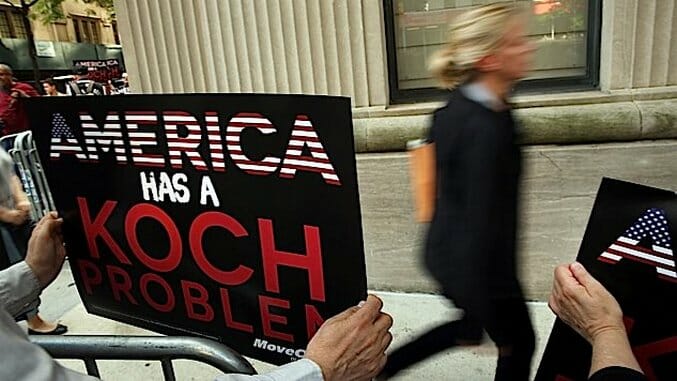Why Won’t the Kochs of the World Run For Office Themselves?
Photo by Spencer Platt/Getty
Here’s a thought experiment: why shouldn’t Charles and David Koch — along with all the others of the ‘Koch Network’ like Robert Mercer, Carl Ichan, Foster Friess, and many more — run for office themselves instead of seeking to turn the GOP into a shell corporation forever keen to represent their interests? David Koch already ran for office once in 1980, so why shouldn’t he run again?
Consider the marching orders recently given by Doug Deason, as reported by the Chicago Tribune —
“Get Obamacare repealed and replaced, get tax reform passed,” Deason said in a pointed message to GOP leaders. “You control the Senate. You control the House. You have the presidency. There’s no reason you can’t get this done. Get it done and we’ll open [the checkbook] back up.”
Who elected Doug Deason? What makes him qualified to speak on health care and taxes? How has his philosophy developed over the years with regard to health care and taxes? What do doctors think of it? What do tax experts think of it? Did anyone in Texas vote for him? Has Deason ever held any town halls? Why doesn’t Deason or someone like him explain his vision of personal responsibility to someone who would be dead if it weren’t for Obamacare? Why won’t he appear before the Senate and argue against the reality of climate change—because he’s not particularly in the mood to adapt his capital inflows and move away from oil towards wind or solar—and instead seems content to send someone like Rick Perry out to song and dance for him? Why don’t we get to see people like Deason nominate their own secretary of the EPA themselves — in the open, explaining their reasoning every step of the way — instead of using ‘dark money’ to get what they want? Why shouldn’t someone from Exxon run for office and tell their constituents that they want to take away the protected status of their land?
This isn’t intended to sound like a Bernie Sanders riff. This is to walk into the boardroom and ask — perhaps George Costanza-like — “What’s keeping you?” If John M. Olin got mad at AEI because they wouldn’t campaign against the raising of the estate tax in the ‘70s, then why didn’t Olin run for office to do something about it? If people like Deason, Olin, and the Kochs have the courage of their ideas and the courage of their convictions, why don’t they keep trying to run for office like the rest of us? (Even Nigel Farage — champion of Brexit, Trump, and smarmily nonchalant about Putin — ran for office seven times in the United Kingdom, losing each and every time.) In effect, it’s what William F. Buckley tried to do New York, so why not them?
Part of the reason—this is how the Kochs run their operation. Here’s Jane Mayer quoting Charles Koch in her book Dark Money —
In order to avoid undesirable criticism, how the organization is controlled and directed should not be widely advertised.
But part of the answer also seems to stem from an almost psychological manifestation of something Thomas Piketty zeroed in on in his book Capital — namely, the accumulation of wealth as it passed from father to son and onward down the generative line.
Consider how men of great wealth react within Mayer’s book —
“Protestant churches, public schools, universities, labor unions, the armed services, the State Department, the World Bank, the United Nations, and modern art, in his view, were all Communist tools.” (pg. 47.)
“The school taught a revisionist version of American history in which the robber barons were heroes, not villains, and the Gilded Age was the country’s golden era.” (pg. 53)
“Alan Scaife was incredibly worried about inherited wealth.” (pg. 78)
“In August, [future Supreme Court justice Lewis] Powell delivered a seething memo that was nothing less than a counter-revolutionary call to arms for corporate America, warning the business community that its very survival was at stake if it didn’t get politically organized and fight back.” (pg. 89.)
It brings to mind a series of studies examined by The Atlantic that looked at the relationship between power and brain damage, wherein the author noted that academics found that “power lessens the need for a nuanced read of people, since it gives us command of resources we once had to cajole from others.”
But to argue that wealthy people should pursue candidacies where the question of their wealth comes up again and again would give us what? A re-hash of the 2016 campaign? A re-hash of the muted fact that those of a certain income level went for Trump?
Perhaps a campaign from a Koch or Koch-like equivalent would further emphasize what an outsized impact so few people have had on the political process — akin to what the far-right is doing in Poland today — especially if we take into account who currently makes up the 1% in our country:
The Koch Rich are moving in a fairly specific John Birch-styled direction — have been for the past thirty-plus years — but — as Jonathan Rothwell points out in a post over at Evonomics (a post from which the above graphic comes) — it doesn’t have to follow that the 1% in this country have to follow in the same direction as well. If there’s greater access to the investment market — if there’s greater job competition amongst dentists (really) — then the question of a “natural base” existing for someone of means obsessed with varieties of inheritance tax might end up being besides the democratic point.
And then we can go vote for someone else.








































